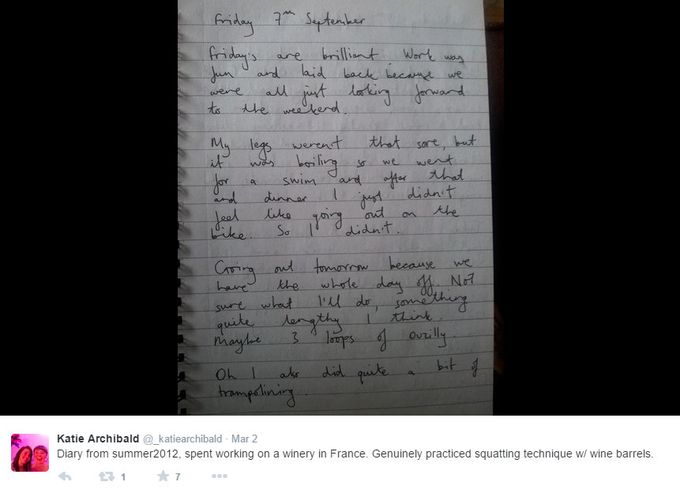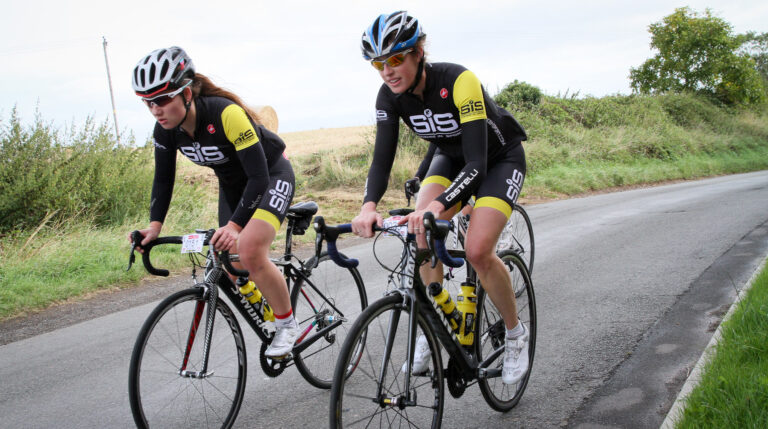Long term readers will know we’ve got a little bit of an obsession with Katie Archibald – we think she’s pretty rad.
A couple of tweets, where she posted glimpses of old training diaries, made us ponder on then importance of keeping a written account of day to day activity…

Here are 8 ways keeping a training diary can help you in your cycling:
1) Motivate yourself
There are some days when you wake up feeling tired, lacking in motivation, or it’s just raining outside. But knowing you’re going to have to write down ‘didn’t bother doing anything today’ is a good reason to make sure you get up and go!
2) Keep an eye on your recovery
For some people, motivation isn’t the problem – it’s taking time out that causes them the most difficulty! If you’re prone to over-training, keeping a diary can make it very clear when you’ve not had a rest day for too long, and looking back at completed sessions should reassure you that you do deserve a break.
3) Understand your body’s patterns
Some people train best in the mornings, others in the evening. Women’s hormones play a vital role in how they’re feeling, and performing, too. Keeping a training diary will show you when you are at your best, and when you should accept you need gentler rides.
4) Discover what works
There is nothing worse than putting in an amazing performance, managing a PB, or generally being awesome – and having no idea what gave you the boost. Recording sessions leading up to a race, or what you were doing in the months before you smashed your PB, will help you smash it again.
5) Keep an eye on your nutrition
It’s important to get the balance right – you want to be fit and fast, but you also need to make sure you’re giving your body what it needs (or you won’t be fit or fast). Writing down what you eat can help make sure you’re not over-doing your recovery treats, or under-fueling.
6) Plan your season
It’s hard to work towards a goal without a) knowing what it is, and when it is, b) knowing how many weeks you have to get there, and what you’re going to do with them. Planning events into you calendar, and making sure your training is tailored to help you reach your goals,will help.
7) Boost your confidence
It’s easy to get to your goal event, and feel completely unprepared. Negative thinking can result in a loss of confidence, and you may even find yourself feeling like you’ve done ‘no training at all’. We’re pretty sure this isn’t the case. Having it all written down will prove that to you in moments of doubt.
8) Keep a coach/friend/training pal informed
We can’t all afford the luxury of a coach (though coaching is usually considered a more worthwhile investment that a new bike!) – but recording everything, and letting a more experienced friend of training partner take a look will mean you can work on your strengths and weaknesses together – they might spot patterns you miss.
9) Give yourself time to think
Days can be hectic – sometimes you just get to the end of them, snuggle up in bed, and try to prepare for the next one. Being disciplined, and taking just 10 minutes at the end of each day to record your thoughts, can help you to take stock of what you’ve done, and where you’re heading.
10) Inspire someone else
You never know – you might be the next Katie Archibald – and if so – we want to know HOW many wine-barrel weight squats you did, and how often… (and yes – you can be excellent at any age).
How to keep a training diary?There are plenty of options out there. Firstly, you could just buy a notebook – that’s one option. Alternatively, you could record details in Word or Excel on your computer – Word works best for people who want to record detail, Excel suits number crunchers and people who want to look back on stats in a constructive way.
Alternatively – there are plenty of programmes designed specifically for recording training – such as Training Peaks, which amateur and pro athletes alike use.
What to record?
The level of detail you’ll go into depends upon how you plan to use your diary – but good things to include are:
> A plan for the next phase leading up to an event you want to do well in – ideally write out what you’ll do each day to get you to the event in the best possible shape, including rest days
> Each day, record your level of fatigue (rated out of ten), the training you did, how the session went, any niggles you noticed, and if you’re watching your nutrition, your eating and weight
Liked this? You might also like…
Training Plan for a 100 Mile Sportive : Part 1
How to Make a 30 Minute Ride Count
5 Ways to Increase Your Average Speed





